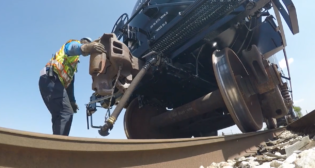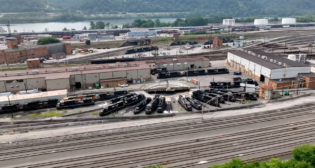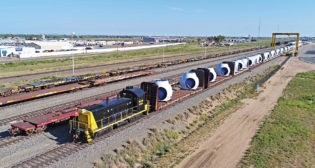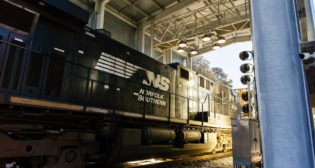
FRA freezes on tank car sloshing; DOE oil volatility bombshell drops like a dud
Written by David Thomas, Canadian Contributing EditorHow crude oil sloshing inside moving tank cars affects train stability was under close scrutiny by the Federal Railroad Administration, the regulator’s Acting Administrator told reporters back on March 13. That was after a string of mid-winter oil train disasters exposed the prevailing focus on tank car thickness to be essentially pointless in the quest to prevent oil train derailments and explosions.
Sarah Feinberg had been appointed in January by President Obama to shake up an agency paralyzed by its own procedures and deservedly reputed for an imperious attitude towards the public’s right to know. So, while skepticism about her knowledge of the railroad business greeted Feinberg’s interim appointment, there was justifiable expectation among we ink-stained wretches that the slick public relations professional would at least fix her agency’s Orwellian-titled “office of communications.”
So with hope in our hearts, on March 17, Railway Age asked the FRA’s media office for any documentation it may have on tank car slosh factors, specifically, “speed, acceleration, deceleration, curvature of track, grade of track, quality of track, degree of car loading (percent full), center of gravity (tank cars do not have heavy center sills that would lower the center of gravity; the tanks are the structural members), viscosity of contents.”
In a remarkable deviation from previous form, the FRA’s public affairs specialist Michael J. Cole responded just nine days later that the agency would indeed make its experts available for an interview.
Two experts would be available for a 30-minute telephone interview at 3:00 pm on March 30: Dr. John Tunna, FRA director of R&D, and Brian Marquis, structure and dynamics specialist with the John A. Volpe National Transportation Systems Center. Delighted, I drifted into fantasies about a Pulitzer Prize for Tank Car Journalism, to add to my honorable mention for Best Canadian Press feature story of the month, sometime in 1970, my first year as a reporter.
You can just imagine the bitterness of my disappointment early on the Big Day when Michael J. Cole sent me an email canceling the interview: “My apologies, but I’ll have to reschedule this interview. Travel plans for several of us involved are interfering with this time. I’ll work with Dr. Tunna and Brian to reschedule as soon as possible.”
After two weeks of fruitlessly refreshing my inbox in deepening despair, I emailed Michael J. Cole a request to reschedule the interview. I guess the heads of official Washington were busy dancing with cherry blossoms because I didn’t get a response until April 27. That was only after, in an uncharacteristic fit of fair play, I advised Michael J. Cole that, “I would like to invite you for a third and final time to schedule an interview with your tank car slosh-factor experts. If I don’t hear from you soon, I will have to proceed with the article without FRA input. I would nonetheless have to mention that it was your Acting Administrator who raised the issue in the first place. It would seem she was all alone on this, without any support from FRA staff. I sincerely hope to avoid having to write the story without your technical insight.”
Obligingly, Michael J. Cole responded: What is a good contact phone number for you?
And that, three days later, is the end of that. No call. No interview. No Pulitzer Prize.
But wait—there’s more, on a related matter, crude oil volatility.
During an appearance before a Senate committee on April 28, U.S. Energy Secretary Ernest Moniz dropped what should have been a media bombshell by revealing that a bi-departmental investigation with the U.S. Department of Transportation is being launched into how differing degrees of volatility affect the safe transportation of crude oil by rail.
Fortunately, McClatchy Newspapers’ Curtis Tate was on hand to report the start of this next step in the reform of moving crude oil by rail. Curiously, McClatchy remains alone in the Google News cull of stories about crude-by-rail. The Department of Energy itself did not bother to emit a news release about its chief’s portentous remark and ignored Railway Age’s request for elucidation. Perhaps it hopes the American Petroleum Institute will not notice.
Even as the White House Office of Management and Budget is on the cusp of decreeing final new regulations for tank car design and oil train operations, it is becoming self-evident to many outside of the oil business that the nuisance of exploding cargo will not be solved before crude is de-weaponized at the well site by cooking off contaminating volatile gases.
The Energy Secretary’s low-key announcement is the beginning of another interminable round of reports and refutations that will safely ensure the oil business is not inconvenienced for years to come.
Despairingly, Moniz said the joint study with the USDOT will take 24 months. That’s two months longer than the interval since the continuing catastrophe of exploding crude started at Lac-Mégantic, Quebec, on July 6, 2013. How many oil trains will derail and explode over the course of the next two years is impossible to predict. The safe guess is more than none.
There was no response from the Department of Energy to our request for more information about the study, specifically why it needs two more years to figure out what by now should be obvious to the dullest high school chemistry student.



